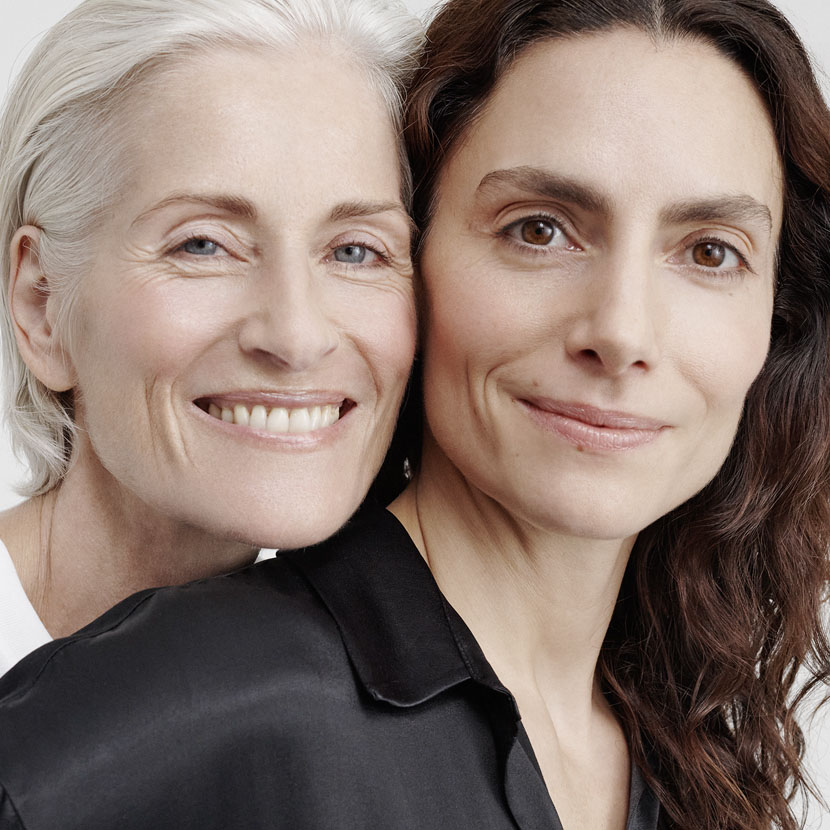Skin aging
Happy birthday, dear skin.
Is your skin turning 40, 50 or maybe 60? Or is it already there? Give it a gift that will best support it in its new phase of life. Anthroposophic dermatologist Dr Brigitte Roesler discusses the skin’s aging process and provides some good tips for slowing it down.
As a dermatologist, you see skin in all phases of life. You know exactly what skin aging means. How does it change after age 40, 50 or 60?
“The skin begins to age even earlier in life, but it’s after menopause that the changes really start to become noticeable. Hormonal changes – which can occur at different times for different women – are more of a deciding factor than age. And while men’s skin takes a little longer to age, at some point they too start reaching for the creams to slow down the process. The first sign of mature skin is always a loss of moisture, which is accompanied by the appearance of wrinkles. I find it interesting that our skin looks more tired in the evening after a day’s work than it does in the morning. At 30, it is still able to recover well overnight. At 40, this recovery process becomes a little more difficult. After 50, the aging process becomes more noticeable: cell renewal slows, hormone levels fall drastically, our subcutaneous fat recedes and fluid starts to accumulate in the body, changing the contours of the upper arms, chin and corners of the mouth. After 60, the skin becomes increasingly dry, thin and transparent, which is why blood vessels can start to become visible. It also develops more areas of pigmentation – on the face and anywhere else that has been exposed to the sun. The most important external factor in skin aging is sun exposure. A combination of good skin care, a healthy diet, good sleep and sun protection all contribute to keeping our skin vital and help prevent premature skin aging.”
So our skin reflects our life?
“That’s right. It reveals an awful lot about our diet, sleep habits, mental state, internal health and vacation preferences. The skin is a like monitor that displays a lot of information, if you know how to read it. Through years of additional training in anthroposophic medicine, I have now achieved a holistic view of the skin and the person behind it.”
What can I do to look after my skin? How can I support it to prevent or slow down its aging?
“Everything that is good for you as a whole is also good for your skin. This means that exercise and a balanced diet with lots of fruits and vegetables are very important. Naturally, you can also practice good skin care. But “good” doesn’t necessarily mean “lots of products”. A thorough facial cleanse in the evening is very important. When washing both the face and the body, it’s important to preserve the skin’s natural flora and not strip it of oil and moisture. And the same goes for all skin care products that I apply: they should provide my skin with a good balance of oil and moisture.”

Does my skin have other, age-specific wishes that I can gift it on my 40th, 50th or 60th birthday?
“At 40, what the skin needs more than anything is hydrating care – as well as care that supports its ability to lock in moisture. After 50, it appreciates practices that counteract the increasing weakening of the connective tissue – like rubbing in body oils and performing dry-brush massages. And after 60, our skin enjoys products with a high oil content that help preserve its natural lipid barrier. It is not that difficult to make your skin happy and to appropriately combat skin aging at any age.”
Dr. Roesler's tips to slow down visible effects of skin aging.
Tip 1: Avoid the sun
Protect your skin from strong solar radiation by seeking shade and spending the hottest parts of summer days indoors. When you do go out in the sun, apply plenty of sunscreen, wear a hat and choose long, loose-fitting clothing.
Tip 2: Relax
Do you feed good in your skin? Think about what brings you joy and feeds your soul. This could be visiting an exhibition, practicing yoga, taking a walk in the woods or working in the garden. Because when you radiate joy, it shows in your skin.
Tip 3: Strengthen your internal organs
Our kidneys are responsible for regulating the body’s moisture levels – a central concern for mature skin. Keep them well flushed out by drinking plenty of water and herbal tea (e.g. horsetail and birch leaf) throughout the day – especially in the afternoon. Another organ that has close ties to our skin is the liver. Strengthen this vital organ with herbal bitters or bitter-tasting foods like chicory, by practicing a spring fasting treatment or by having one fast day per month.
Tip 4: Get enough sleep
Because the skin is active in renewal overnight, good sleep is extremely important. Try to get at least seven hours of sleep – and be in bed by 11 p.m. Your skin’s metabolism is most active at night, so this is also the most important time for recovery and regeneration.
Tipp 5: Detox your skin
You can detox your skin with facial massages, acupuncture or lymphatic stimulation.
Tip 6: Get screened for skin cancer
After 50, the risk of developing skin cancer rises. If you do not already go for regular screenings you should start having a full screening every two years by 50 at the latest. Because skin aging is one thing – your health is a completely different matter!

